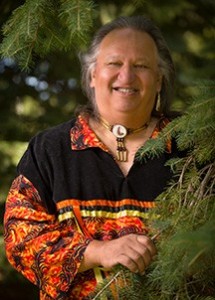Too Indian for an Indian Radio Show
- Share
- Tweet
- Pin
- Share

Richie Plass. Submitted photo.
Regular listeners of Wisconsin Public Radio might have come to know Richie Plass as the genial co-host of Kalihweyo’se (Oneida for “Good Message”), the Native American radio program that airs from 10pm to midnight on Thursdays.
Richie’s good humor, infectious laugh and buoyant spirit have made many listeners regularly welcome him into their homes and cars via WPR for the past decade. But Richie’s days on public radio have come to an end because, apparently, he is too Indian for an Indian radio show.
All WPR Regional Manager Ellen Clark would say about Richie’s recent departure from the show is this, via email: “Richie recently decided to step down from hosting Kalihweyo’se. I wish him all the best and the show will continue on Thursday nights with host Chris Powless.”
While it is true Richie decided to step down, it was only after being warned that he could no longer tell Indian jokes, nor could he talk about Indian politics and issues.
“It’s amazing that an Indian on an Indian radio show can’t tell Indian jokes,” Richie said in a recent telephone conversation.
Richie decided to leave after he was told that he was going to be closely watched and listened to by WPR officials, so he would have to change his ways to remain a part of the show.
“I’m sorry man, after 10, 11 years, all of a sudden I’m the scourge of public radio,” Richie said. “I don’t want to hurt the show. I want the show to stay on. But I ain’t doing it. I’m not going to change. I’m going to be me.”
This truly sounds as though Richie was a victim of the dreaded PC – Political Correctness. Why dreaded? Because it often has the opposite effect it is intended to have. In this case, the PC police wanted to clean up Richie’s on-air presentation, forgetting that as host of a Native American show, Richie was performing the humor of his ancestors.
There is a section in the Encyclopedia of Humor Studies that details American Indian humor, particularly the trickster tradition, teasing and self-deprecating humor.
Trickster stories are essentially morality tales that “instruct American Indians to maintain a positive attitude in the face of even the most severe suffering,” the Encyclopedia states. “A key element of having a positive attitude is maintaining a sense of humor. Thus, the importance of having a sense of humor is something that is taught by trickster stories of American Indians, and, as a result, humor is an important part of their cultures.”
It goes on to say that, “Both historically and in the modern era, teasing is an important component of American Indian humor.” One of the things Richie was called out on by Regional Manager Clark was an interview with a young Menominee hip hop artist. Richie asked him a serious question, but in the teasing tradition. The young interviewee got the joke, but Clark apparently did not.
Clark also brought up Richie’s self-deprecating humor, saying at a meeting that, “Richie does not have to put himself down.”
That same humor encyclopedia broaches the subject: “Another important aspect of teasing is the ability of an individual to tease oneself, that is, to engage in self-deprecating humor. Making light of oneself demonstrates that one understands one’s place in society and seeks to maintain social equality and harmony, two goals of teasing behavior among American Indians. If one is able to make light of oneself, there is also more of a willingness on the part of others to accept teasing from that individual. Thus, self-deprecating humor is an important aspect of humor in American Indian cultures.”
Anyone who grew up around Indians would not have to read the Encyclopedia of Humor Studies to know that.
So, recognizing he could not change his ways and that he didn’t want to be watching over his shoulder every on-air moment, Richie decided to leave, knowing that he has made many friends while simply being Richie Plass over the airwaves.
“I don’t know what to make of this. I think there’s a lot more to it,” Richie said.
Someone suggested Richie was squeezed out because of money constraints at public radio, which made Richie laugh. “I’m a volunteer!”
What hurts the most for Richie is knowing that he has made a difference during his time on Kalihweyo’se.
“We have a lot of listeners who are locked up,” Richie said. “Just in this last year, I’ve had so many people, men and women, give me a hug, shake my hand, thanked me for the stories, the jokes, that it helped them get through their time. The last one was just two weeks ago. I’m not making this up.”
That gives him the sign that there is a place for his voice.
“I’m probably going to start my own podcast show on the Internet right out of my house,” he said.
Stay tuned. We’ll let you know when Richie can be heard again.


